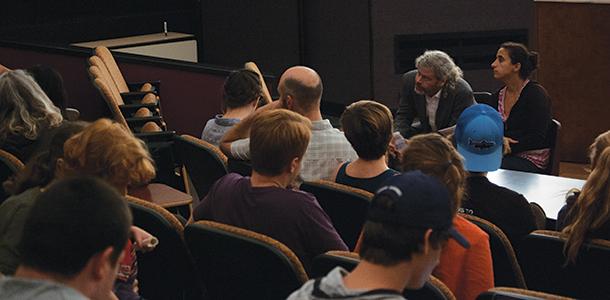Panel educates community about crisis
Mortenson and Abdo listen to a question during a panel on the Syrian refugee crisis.
On Sept. 29, students, faculty and community members gathered in Joseph Bryan Jr. Auditorium to learn about the Syrian refugee crisis and why it should matter to them. After a two-hour panel discussion, they left inspired to take action.
The panel featured Associate Professor of Political Science Maria Rosales, Bonner Center Volunteer Training Coordinator Andrew Young, Grassroots Organizer at The Church World Service Adamou Mohamed, Resettlement Coordinator at The Church World Service Kim LeBlanc, Director of The University of North Carolina Greensboro Center for New North Carolinians Raleigh Bailey, Professional Engineer Zane Kuseybi, Assistant Professor of Management Information Systems at Elon University Haya Ajjan, Associate Professor of English Diya Abdo, Operations Manager at the N.C. African Services Coalition Latosha Walker and was monitored by Associate Professor of Religious Studies Eric Mortensen.
Twelve million people — children, mothers, fathers and friends — have been fleeing their homes and their lives in Syria since the outbreak of civil war in March 2011. Over four million have fled to neighboring countries, while eight million have become internally displaced. As the number of refugees fleeing to Europe increases, the world is beginning to take notice.
“(The crisis) was reaching catastrophic levels,” said Abdo. “The panel came as a way of educating the community about the crisis so that we can act with more information, with more compassion and certainly, with more context.”
In materializing her vision, Abdo received help from faculty and community members.
“What happens is someone has a really good idea, and they get energy behind it,” said Mortensen. “It’s very possible to make these kinds of things happen as long as you decide to go for it.”
The panel had a variety of perspectives in hopes of adding to the depth of information conveyed. Some of the speakers were from Syria and had families trying to survive as refugees.
“My cousin walked,” said Ajjan during the panel. “He walked from Serbia to Macedonia to Hungary, got captured in Hungary by police, spent one week in prison, was taken back to the Serbian border and then walked back. He’s now in Austria.”
Immediately following the panel discussion was a Call to Action Meeting that focused on how members of our community could find ways to address the crisis directly. The Call to Action Meeting and the panel were both organized as part of Abdo’s Every Campus A Refuge initiative.
“As a Quaker institution, we have a history of response to people suffering from crises of natural and human-made creation,” said Interim Chair of Peace and Conflict Studies Max Carter. “Both in terms of a human response and our own history, I think it’s a natural thing (for Guilford).”
If you are looking to learn more about crises around the world, there will be a panel called “Elections, Floods, Ethnic & Religious Conflict and the Seas of Change in Myanmar” taking place on Oct. 26 in The Moon Room of Dana Auditorium.
“What happens is someone has a really good idea, and they get energy behind it,” said Mortensen. “It’s very possible to make these kinds of things happen as long as you decide to go for it.”
The panel presented a variety of perspectives in hopes of adding to the depth of information conveyed. Some of the speakers were from Syria and had families trying to survive as refugees.
“My cousin walked,” said Ajjan during the panel. “He walked from Serbia to Macedonia to Hungary, got captured in Hungary by police, spent one week in prison, was taken back to the Serbian border and then walked back. He’s now in Austria.”
Immediately following the panel discussion was a Call to Action Meeting that focused on how members of our community could find ways to address the crisis directly. The Call to Action Meeting and the panel were both organized as part of Abdo’s Every Campus A Refuge initiative.
“As a Quaker institution, we have a history of response to people suffering from crises of natural and human-made creation,” said Interim Chair of Peace and Conflict Studies Max Carter. “Both in terms of a human response and our own history, I think it’s a natural thing (for Guilford).”
If you are looking to learn more about crises around the world, a panel called “Elections, Floods, Ethnic & Religious Conflict and the Seas of Change in Myanmar” will take place at 7 p.m. on Oct. 26 in The Moon Room of Dana Auditorium.







